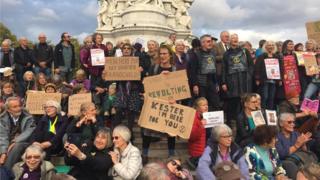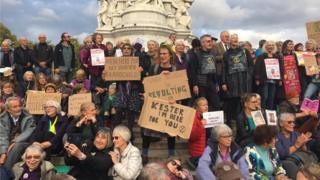Extinction Rebellion Grandparents: Our generation is partly responsible
Despite a London-wide police ban, a group called Extinction Rebellion Grandparents continued to protest. …


“This is a rebellion, our house is on fire,” sang a crowd of pensioners to the tune of Elvis Presley’s Hound Dog as they stood outside the gates of Buckingham Palace.
“If we don’t act now, it will be our funeral pyre.”
The group, called Extinction Rebellion Grandparents, is part of the wider Extinction Rebellion campaign, which is currently in the middle of two weeks of protests in London.
Despite a city-wide police ban on the protests, the group of mainly over 60s gathered in central London on Tuesday afternoon for what was billed as “not a protest or an action, but a family friendly photo”.
“It’s our generation that is partly responsible for the fate that will befall our grandchildren,” said Peter Cole, 75, one of the protesters.
“So it behoves us to do the least we can to try and help them.”
The retired professor, whose history of protesting goes back to US civil-rights rallies in Mississippi and Alabama in the 1960s, added: “There’s a lot of passionate oldies, a lot of passionate youngsters.”
He added that he and others were “scared stiff” at some of the predictions about the impact of climate change.
Others in the crowd also repeated the suggestion that they felt their generation had been partly to blame.
“I think there’s a lot of our generation who realise we have contributed to it all our lives, not willingly but that’s the way the system has been,” said Gaynor, 66, who travelled up from Cornwall to take part.
“But we feel really responsible with the next generation. We stand in solidarity with the youngsters.”
Satnam Kaur Khalsa, 63, from Hounslow, was joined at the protest by her daughter, son-in-law and three grandchildren, all who travelled from Mexico for the ongoing rallies.
“I want to help make sure there is a place for these children to live and prosper,” said Ms Kaur Khalsa, “Like we had an opportunity to when we were young.
“We could plan our future. Their future is murky at the moment, they don’t know what’s going to happen.
“We didn’t really think of the consequences.”
Ms Kaur Khalsa’s daughter, Harmeet, who has lived in Mexico for the past 15 years, said she wanted to join the Extinction Rebellion movement after seeing footage of the earlier rallies in April.
“Watching the footage in London, we made plans to join my mum,” said Harmeet, 42, a former freelance travel writer who now works in teaching. “We will be here for a few months.”
She added that people in the mountain village where she lived in Mexico were “worried” about the impact of climate change, after temperatures were unexpectedly high earlier this year.
Also at the protest was playwright and novelist Michael Frayn, 86, who said he was introduced to the Extinction Rebellion cause by his grandson, Jack Harries, a YouTuber and environmental activist.
Jack was arrested at a protest in April, and said: “Granddad wrote me a witness statement for court. That was what started the dialogue.
“It feels like a really significant moment for him to be here.”
Mr Frayn said he has seven grandchildren and does not want to see their lives “blighted or cut short” by climate change.
Meanwhile, for Imogen Sibona, a 60-year-old small business owner from New Malden, the fact that older people may have more time is also a reason why it’s important for them to protest.
She said: “I work part time and I’m able to use some time to come here,” she said. “My kids can’t. Most people have not got much time on their hands.”
Led by two musicians, the crowd, gathered on the steps of the Queen Victoria Memorial, also sang songs with the lyrics: “In the voice of my great granddaughter, climate justice now,” and, “We are rebelling to save our children.”
For many of the campaigners outside the palace, it was not their first time at a rally.
Gilly Hatch, 74, a painter originally from New York but who lives in north London, said she had been protesting since the Vietnam War.
But she stressed she did not enjoy it, because of her dislike of crowds.
Her presence is testament to the importance she places on the cause. “It’s the most important issue we face at the moment,” she said.
“I have a granddaughter and think that makes it feel more intense and important.
“But it’s not just for her, it’s for everybody.”




